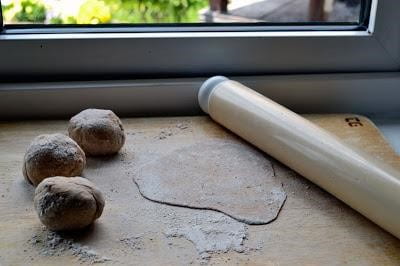Culina Quarantina: A Series of Roman Recipes
By Alicia Lopez
Recently, I’ve been doing a lot of cooking and baking to help pass the time in quarantine, so I decided to look into what cooking would have been like in Ancient Rome. Here are some of my favorite ancient recipes to help get you through quarantine. Bonam fortunam! You can find previous recipes here.
French Roman Toast
From Apicius’ De Re Coquinaria 7.11.3
Aliter dulcia: siligineos rasos frangis, et buccellas maiores facies. in lacte infundis, frigis [et] in oleo, mel superfundis et inferes.
“Slice fine white bread, remove the crust, and break it into large pieces. Soak these pieces in milk and beaten egg, fry in oil, and cover with honey before serving.”
Ingredients: 
- 3 Eggs
- 200ml Milk
- Honey
- Sliced Bread
Recipe:
- Thinly slice the loaf of bread – it fries better this way. Remove the crusts, and break into large chunks if you wish.
- Break the three eggs into a casserole dish or a bowl. Add the 200ml of milk and mix it all together.
- Soak the bread slices/chunks in the mixture for a few seconds on each side. If you soak them for too long, the end result will be more omelette than toast (still tasty mind you). Drain the excess mixture off.
- Drop the bread into a hot, oily frying pan. Turn it over occasionally, making sure it doesn’t burn. You know it’s done when it starts to look like the picture below. When you’re ready to serve, cover it in honey, as per the recipe. Cinnamon works well too and was available to the Romans.
Source: http://pass-the-garum.blogspot.com/2013/10/roman-french-toast.html
Laganum
Laganum comes from the Greek word “lasanon” or “laganon”, which could mean, among other things, a focaccia-like flat bread.
Patina Cotidiana
Accipies frustra suminis cocta, pulpas piscium coctas, pulpas pulli coctas. Haec omnia concides diligenter. Accipias patellam aeneam, ova confringes in caccabum et dissolves. Adicies in mortarium piper, ligusticum, fricabis, suffundes liquamem, vinum, passum, oleum modice, reexinanies in caccabum, facies ut ferveat. Cum ferbuerit, et obligas. Pulpas quas subcultrasti in ius mittis. Substerne diploidem patinam aeneam et trullam plenam pulpae, et disparges oleum et laganum pones similiter. Quotquot lagana posueris, tot trullas inpensae adicies. Unum laganum fistula percuties, in superficiem pones. A superficie versas in discum, piper asperges et inferet.
An Everyday Dish
“Take pieces of cooked sow’s udder, cooked fish, chicken meat and similar bits. Mince evenly, and carefully season. Get a metal dish; set aside. Break eggs in a bowl and mix them. Crush pepper, lovage and origany in a mortar. Add to this broth, wine, raisin wine and a small amount of oil; add this to the beaten egg, mix and heat in a hot water bath. When thick, mix with the meat mixture. In the metal dish you set aside, put alternate layers of the egg-meat mixture with layers of laganum, with oil in between. The last layer should be a laganum with a hole cut in it to allow steam to escape. Cook this in a hot water bath. To serve, turn out of the metal dish upside down and sprinkle with pepper.”
Ingredients:
- 100g Spelt Flour (+ extra for dusting)
- Water
Recipe:
- Prepare a work surface by sprinkling over some flour.
- Pour 100g of flour into a bowl and add just enough water to form a dough. Knead this by hand, adding more flour as necessary, until it is neither too wet nor dry.
- Divide the ball of dough into equal pieces. Roll these one at a time until they are flat, disc-shaped, and uniformly thin.
- Add a drop of oil to a frying pan, and when it is hot enough, set a laganum in. As it cooks, it will start to puff-up in places as pockets of air are formed. When dark spots start to form on the underside, flip it over. Each side should take about a minute to cook. If needs be, press down on the top side to speed things up.
Source: http://pass-the-garum.blogspot.com/2013/06/lentil-and-root-veg-mash-with-spelt_10.html
Alicia Lopez (College ’23) is a student at the University of Pennsylvania studying Classical Studies and English.